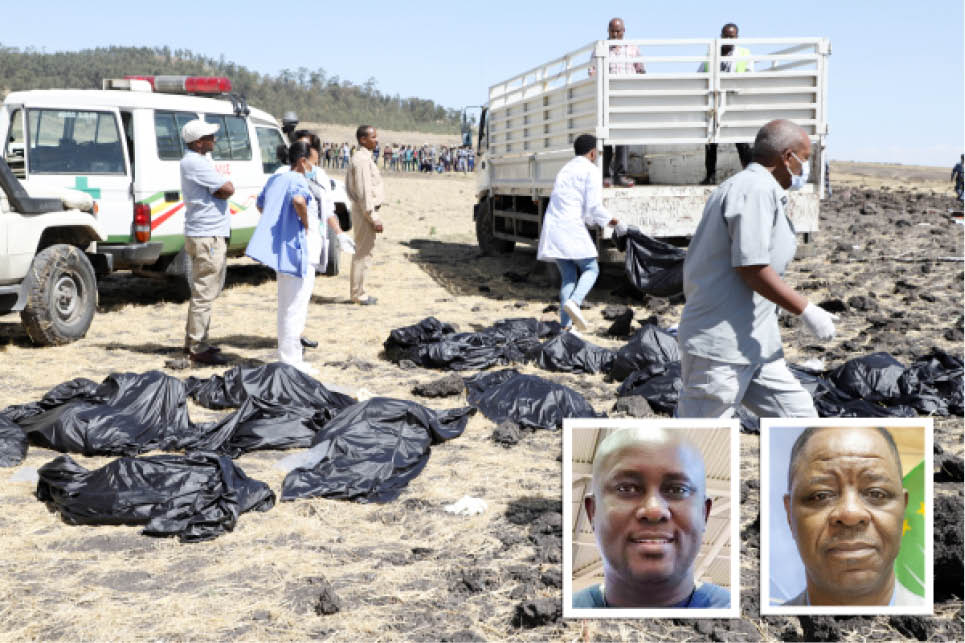The world suffered yet another major aviation tragedy on Sunday, March 10, 2019 when Ethiopian Airlines Flight ET302 crashed near the town of Bichoftu, 62 kilometres south-east of Addis Ababa. It crashed six minutes after take-off from Bole International Airport. The aircraft, a Boeing 737 Max, was on its way to Kenya’s capital, Nairobi. The flight’s passengers were from 32 countries including Nigeria, Kenya, Canada, Ethiopia, USA, China, Britain, France, Egypt, Netherlands, India, Russia, Morocco, Israel, Uganda, Yemen, Sudan, Togo, Mozambique and Norway.
Two Nigerians, Professor Pius Adesanmi and Ambassador Abiodun Bashua were among the 157 people on-board. Both travelled with other passports; while Adesanmi travelled with his Canadian passport, Abiodun travelled with United Nations passport. Following the accident, nations across the world ground the aircraft type. Singapore, China, India, South Korea, Mongolia, European Union, Australia, New Zealand, Iceland, Norway, Argentina, Turkey, Egypt, Serbia, United Arab Emirates, Kuwait and Oman all grounded it.
The Federal Government here also banned Boeing 737 Max aircraft from flying in the country. Minister of Aviation Hadi Sirika announced this after last week’s Federal Executive Council (FEC) meeting in Abuja. The plane’s maker Boeing later grounded its entire global fleet of 371 such aircraft after investigators uncovered new evidence at the scene of the fatal crash.
Ethiopian Airline’s Group Chief Executive Officer Tewolde GerbreMarian said there were no survivors from the crash. The aircraft involved in this accident is less than four months old. This was the second fatal accident involving Boeing 737 Max in less than five months. Lion Air Flight 610 with 189 people on board crashed into the sea shortly after take-off from the Indonesian capital, Jakarta, on October 29, last year.
Ethiopian Airline is one of the biggest carriers in Africa by fleet size. Its last major crash was in January 2010, when a flight from Beirut went down shortly after take-off. GebreMarian said although it is too early to speculate on the cause of the accident, a senior captain named Yared Getachew with a cumulative more than 8,000 flight hour was commanding the flight while first officer Ahmed Nur Mohammod Nur had 200 flight hours.
President Muhammadu Buhari has since condoled with the government and people of Ethiopia over the crash. He said “such large-scale loss of human lives in a single accident is shocking beyond words”. Minister Sirika also said, “There is no cause for alarm as there is no operator in Nigeria that is using that type of airplane.” He said the Nigeria Civil Aviation Authority whose mandate it is to issue advisory, has already declared that nobody should fly into or out of Nigeria using Boeing 737 Max 8 and Max 9 pending the determination of the actual cause of the Ethiopian crash and also pending the response of the manufacturer, Boeing.
Regarding two Nigerian airlines, Air Peace and Arik that have placed orders for the supply of Boeing 737 Max aircraft, Hadi Sirika said, “Whether those orders were confirmed or intent, it is to our knowledge in the ministry that they won’t be in the country until the next two years or so. And this is enough time to sort out whatever problem it is with that plane.” He further said if a particular malfunction is identified to be the problem, such as landing gear, a directive would be issued to ground such planes worldwide until the problem is fixed.
In spite of Ethiopian Airline’s very good safety record, the crash of its Boeing 737 Max aircraft caused concern in the world of aviation. We express our condolences to all the victims’ families, particularly of the two eminent Nigerian victims of the crash. Ethiopian is probably Africa’s best airline and this accident should not dent its success story. We call for a speedy completion of investigation into the crash so that the real cause of the accident would be found and ameliorated. This should relieve the fear and anxiety of African air travellers.

 Join Daily Trust WhatsApp Community For Quick Access To News and Happenings Around You.
Join Daily Trust WhatsApp Community For Quick Access To News and Happenings Around You.


